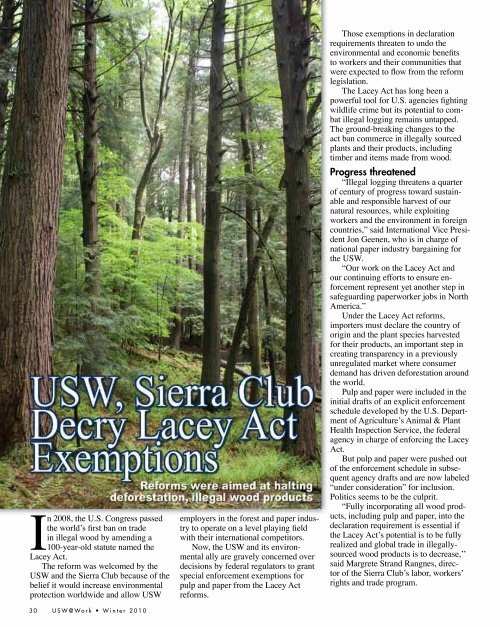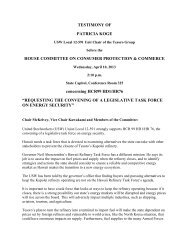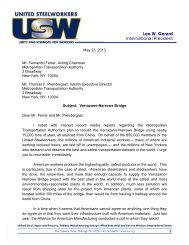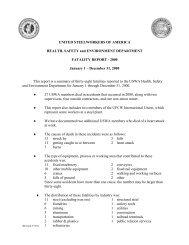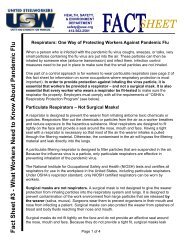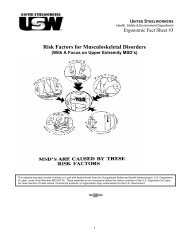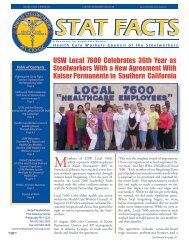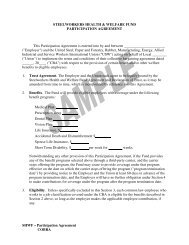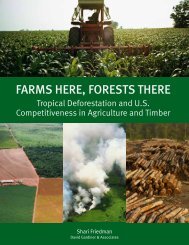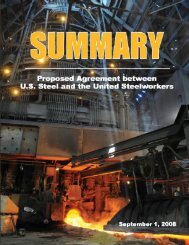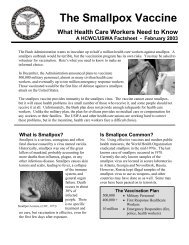Leo W. Gerard - United Steelworkers
Leo W. Gerard - United Steelworkers
Leo W. Gerard - United Steelworkers
You also want an ePaper? Increase the reach of your titles
YUMPU automatically turns print PDFs into web optimized ePapers that Google loves.
In 2008, the U.S. Congress passed<br />
the world’s first ban on trade<br />
in illegal wood by amending a<br />
100-year-old statute named the<br />
Lacey Act.<br />
The reform was welcomed by the<br />
USW and the Sierra Club because of the<br />
belief it would increase environmental<br />
protection worldwide and allow USW<br />
employers in the forest and paper industry<br />
to operate on a level playing field<br />
with their international competitors.<br />
Now, the USW and its environmental<br />
ally are gravely concerned over<br />
decisions by federal regulators to grant<br />
special enforcement exemptions for<br />
pulp and paper from the Lacey Act<br />
reforms.<br />
Those exemptions in declaration<br />
requirements threaten to undo the<br />
environmental and economic benefits<br />
to workers and their communities that<br />
were expected to flow from the reform<br />
legislation.<br />
The Lacey Act has long been a<br />
powerful tool for U.S. agencies fighting<br />
wildlife crime but its potential to combat<br />
illegal logging remains untapped.<br />
The ground-breaking changes to the<br />
act ban commerce in illegally sourced<br />
plants and their products, including<br />
timber and items made from wood.<br />
Progress threatened<br />
“Illegal logging threatens a quarter<br />
of century of progress toward sustainable<br />
and responsible harvest of our<br />
natural resources, while exploiting<br />
workers and the environment in foreign<br />
countries,” said International Vice President<br />
Jon Geenen, who is in charge of<br />
national paper industry bargaining for<br />
the USW.<br />
“Our work on the Lacey Act and<br />
our continuing efforts to ensure enforcement<br />
represent yet another step in<br />
safeguarding paperworker jobs in North<br />
America.”<br />
Under the Lacey Act reforms,<br />
importers must declare the country of<br />
origin and the plant species harvested<br />
for their products, an important step in<br />
creating transparency in a previously<br />
unregulated market where consumer<br />
demand has driven deforestation around<br />
the world.<br />
Pulp and paper were included in the<br />
initial drafts of an explicit enforcement<br />
schedule developed by the U.S. Department<br />
of Agriculture’s Animal & Plant<br />
Health Inspection Service, the federal<br />
agency in charge of enforcing the Lacey<br />
Act.<br />
But pulp and paper were pushed out<br />
of the enforcement schedule in subsequent<br />
agency drafts and are now labeled<br />
“under consideration” for inclusion.<br />
Politics seems to be the culprit.<br />
“Fully incorporating all wood products,<br />
including pulp and paper, into the<br />
declaration requirement is essential if<br />
the Lacey Act’s potential is to be fully<br />
realized and global trade in illegallysourced<br />
wood products is to decrease,’’<br />
said Margrete Strand Rangnes, director<br />
of the Sierra Club’s labor, workers’<br />
rights and trade program.<br />
Illegal logging costs<br />
In the <strong>United</strong> States, illegal logging<br />
makes it impossible for workers and<br />
their employers to successfully compete.<br />
Legitimate timber companies are undercut<br />
on price by illegal loggers who do not<br />
pay fees to their governments or pay the<br />
true market price for the trees they cut.<br />
Many hundreds of workers, including<br />
a significant fraction of the workers<br />
remaining in the coated paper sector, face<br />
harm from plant closings and production<br />
curtailments. The economic effects will<br />
ripple through local economies where<br />
plants are located.<br />
“The USW has seen true devastation<br />
among our members as multiple plants<br />
have closed or reduced production, in<br />
large part because of imports from nations<br />
where illegal logging is a large part<br />
of the timber supply,’’ said Holly Hart,<br />
the USW’s legislative director in Washington,<br />
D.C.<br />
Leaving pulp and paper out of the<br />
enforcement schedule for the declaration<br />
requirement will allow the economic<br />
devastation in the <strong>United</strong> States caused<br />
by illegal logging to continue without<br />
check, Hart and Strand Rangnes wrote in<br />
a protest letter to the agency.<br />
Environmental damage<br />
Beyond the obvious economic problems,<br />
exempting pulp and paper from<br />
enforcement will fail to help curb the<br />
environmental damage caused by illegal<br />
logging in the countries of origin. An estimated<br />
30 percent of the global warming<br />
pollutants released into the atmosphere<br />
each year are blamed on deforestation.<br />
If imports of illegal logs are to be<br />
curtailed, importers must be held fully<br />
responsible for the materials they import<br />
and for accurately completing the required<br />
declarations.<br />
If the bar of responsibility is set any<br />
lower, less than scrupulous importers will<br />
have a significant window of opportunity<br />
by which to evade compliance.<br />
The USW and the Sierra Club call<br />
for a strong enforcement program with a<br />
predictable schedule for covering imports<br />
of pulp and paper, wood and products<br />
made from wood.<br />
We also support creation of an electronic<br />
filing system for declarations and<br />
an electronic database of covered plants,<br />
including tools to track wood and assess<br />
the risk of illegal wood sourcing within a<br />
supply chain.<br />
The <strong>United</strong> <strong>Steelworkers</strong> responded immediately to the horrific earthquake in<br />
Haiti by offering support and solidarity.<br />
Within 24 hours of the Jan. 12 tragedy, International President <strong>Leo</strong> W. <strong>Gerard</strong> and<br />
Canadian National Director Ken Neumann announced a $20,000 donation from the<br />
<strong>Steelworkers</strong> Humanity Fund to assist with emergency aid efforts in the Caribbean<br />
country.<br />
“Many of our sisters and brothers who live and work in the <strong>United</strong> States, Canada<br />
and the Caribbean have friends and relatives from Haiti. Our hearts and thoughts are<br />
with them during these trying moments,” <strong>Gerard</strong> said.<br />
“It’s times like these that we are reminded that regardless of the bloodline that<br />
runs through our veins, or the address of the place we call home, we are all family<br />
connected by our common humanity.”<br />
Neumann said the USW pledged continued support, solidarity and prayers to the<br />
people of Haiti and their family and friends around the world. “We will be with them<br />
as they work to overcome this terrible tragedy,” he added.<br />
Founded by the <strong>United</strong> <strong>Steelworkers</strong> in 1985 in Canada, the <strong>Steelworkers</strong> Humanity<br />
Fund is a registered charitable organization. USW members contribute to the fund<br />
through clauses negotiated into collective agreements. In a number of agreements,<br />
matching contributions have been negotiated from employers.<br />
The mandate of the fund is to address issues of hunger and poverty, primarily in<br />
the developing world, through development assistance and emergency aid. The fund<br />
has made numerous donations, including assistance to victims of Hurricane Katrina<br />
in the <strong>United</strong> States and over $900,000 to Canadian food banks.<br />
For USW members or locals wishing to donate, please send checks made out to<br />
<strong>Steelworkers</strong> Charitable and Educational Organization to: <strong>United</strong> <strong>Steelworkers</strong>, c/o<br />
Vice President (Human Affairs) Fred Redmond, Five Gateway Center, Pittsburgh, PA<br />
15222.<br />
The <strong>United</strong> <strong>Steelworkers</strong> Charitable and Education Organization is a 501(c)(3)<br />
charitable organization and contributions are tax deductible.<br />
<strong>Steelworkers</strong> wishing to donate to the Humanity Fund in Canada can send checks<br />
to: <strong>Steelworkers</strong> Humanity Fund, 234 Eglinton Ave., East Suite 800, Toronto, Ontario<br />
M4P 1K7. Please note that U.S. donations to the Humanity Fund are accepted but are<br />
not tax deductible.<br />
The TransAfrica Forum, a longtime ally of the union movement, also suggested<br />
donations to two organizations already providing aid on the ground:<br />
Partners in Health (http://www.pih.org/inforesources/news/Haiti_Earthquake.html)<br />
and Doctors Without Borders<br />
(http://www.doctorswithoutborders.org/).<br />
Left: Aid worker helps earthquake victim.<br />
Right: Damage to buildings was widespread in Haiti.<br />
30 USW@Work • Winter 2010<br />
USW@Work • Winter 2010 31


